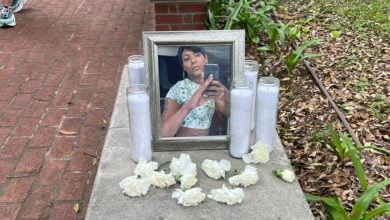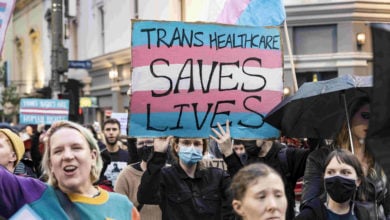The following is an open letter signed by 45 leaders and activists in the Lesbian, Gay, Bisexual and Transgender (LGBT) rights movement on the basis for solidarity with immigrant rights’ movements. It was published in the April 11 issue of The Advocate.
We are a group of lesbian, gay, bisexual and transgender people of color who work in the LGBT movement. We are writing to you in response to Jasmyne Cannick’s article “Gays First, Then Illegals,” which ran in [the LGBT magazine] The Advocate, in which she, a Black lesbian, argues that she cannot support the current battle for immigrant rights because LGBT people have not yet won the right to marry. We are writing to express our profound disagreement with her, and to offer alternative LGBT perspectives to the current immigration battles happening across the country.
To begin with, Cannick fails to realize an obvious fact: the LGBT community and the immigrant community are not mutually exclusive. There are thousands of LGBT immigrants in this country. There are thousands of Black immigrants. And there are thousands of Black LGBT immigrants. To put forward an argument that says “we should get ours first” makes us question who exactly is the “we” in that analysis. In addition, we recognize the historically interconnected nature of the immigrant and LGBT struggles such as the ban on homosexual immigrants that extended into the 1990s, and the present HIV ban, which disproportionately impacts LGBT people, and we believe that only by understanding these connections and building coalition can we ensure real social change for all.
And we ask those who share the destructive views of this article to remember the immortal words of Audre Lorde when she said that there is no hierarchy of oppression. We reject any attempts to pit the struggle of multiple communities against each other and firmly believe that “rights” are not in limited supply. We condemn the scarcity-of-rights perspective espoused by Cannick and other members of the LGBT movement, and are surprised to see members of our community trafficking in such ugliness. But then, one reason why it has always been so hard to shift power in this country is because the ruling class has successfully made us believe that there are only a few deserving groups to whom rights can be given. This strategy has always been used to divide oppressed groups from coming together to work in coalition.
We are painfully aware that lesbian, gay, bisexual and transgender communities still lack many basic protections under the law in this country, including the right to care for and support all of our families, in the various ways in which we construct family and kinship. Nevertheless, supporting immigrant rights, while we continue to work for LGBT liberation, does nothing to hurt our cause. In fact, we believe the opposite to be true, and want to work towards building powerful coalitions between immigrant and LGBT movements to work together for social justice.
We are also aware that many immigrant right advocates have (intentionally or not) used anti-Black rhetoric to move their agenda forward. Arguments such as “Don’t treat us like criminals” or “We are doing work that other Americans won’t do,” have the effect of positioning immigrant narratives as subtly juxtaposed with American stereotypes of non-immigrant Black communities. They leave native-born Black Americans as among the only people who do not have access to the immigrant narrative, and so are in a permanent position of subordination, as the state consistently negotiates and redefines citizenship and American-ness for almost everyone but Blacks.
Nevertheless, the solution to this problem is not to abandon support for the struggle of immigrant communities. Rather, we call on immigrant movements (and non-immigrant) Black organizations to work together for real racial and economic justice in this country. Together these movements can work to end the exploitation and targeting of both communities, and to ensure that Black folks and immigrants do not end up having to choose between competing for low-paying jobs, or being targeted for detainment or imprisonment.
As lesbian, gay, bisexual and transgender people of color, we support the current immigrant rights marches and rallies happening across the country this month, and we march too.
We march because immigrants are among the most politically vulnerable, underpaid and exploited communities in the country, and are asking for basic human rights, including the right to live free from torture and exploitation, and the right to work.
We march because we recognize the connections between the state attacks on immigrant and LGBT communities, and that LGBT immigrants in particular are disproportionately affected by much anti-immigrant legislation.
We march because we oppose the heightened policing and criminalization of immigrant communities, including the increased militarization of the border, as mandated by HR 4437 and Senate bills.
We march because we oppose indefinite and mandatory detention of non-citizens as well as the mass incarceration of people-of-color-communities in the United States more broadly and envision a society that ensures the safety and self-determination of all people, regardless of national origin, race, class, gender or sexuality.
We march because we oppose the guest-worker proposals, which would continue the exploitation of many low-wage workers. We march because we demand the repeal of the HIV ban. We march because our sexualities have been historically criminalized by this country, and we understand that law and justice are not the same thing.
It is our understanding that Jasmyne Cannick was writing as an individual, and not as a representative of either the National Black Justice Coalition (on whose Board of Directors she serves) or The Stonewall Democrats (for whose Black Caucus she serves as co-chair). As LGBT people of color, we call upon both of those organizations to publicly clarify their own positions in this ongoing civil rights discussion.
We also call upon our community to imagine how much more progress we could make if we all stopped thinking of social justice as a zero-sum game.
240 4 minutes read





